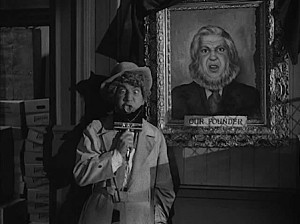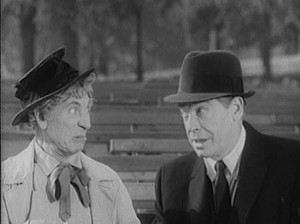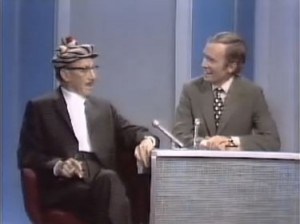STUDIO: Shout! Factory | DIRECTOR: Assorted | CAST: Groucho Marx, Chico Marx, Harpo Marx
RELEASE DATE: 8/12/14 | PRICE: DVD $39.97
BONUSES: assorted Marx Brothers TV appearances, family home movies
SPECS: NR | 630 min. | Comedy | fullscreenRATINGS (out of 5 dishes): Movie
| Audio
| Video
| Overall
Marx Brothers cultists have long wished that the team had made more than a mere thirteen films, about half of which are uneven (at best). Aside from Groucho’s much-beloved You Bet Your Life, biographers of the brothers have omitted discussions of their collaborations and solo work on TV. The Marx Brothers TV Collection — a three-disc set with an extra disc of material available for those who purchase the set directly from Shout! Factory — fills that void by offering a survey of their rarest TV appearances, which range from the mundane to the hysterical.
The three brothers appeared together only once on television, in the last seconds of “The Incredible Jewel Robbery,” a dialogue-less 1959 comedy episode of The General Electric Theater (hosted by Ronald Reagan). “Jewel Robbery” starts off this collection and is undoubtedly one of its highlights, as it shows Harpo and Chico smoothly working in tandem as silent comics (Groucho shows up at the end to utter the sole line of dialogue — “We won’t talk until we see our lawyer!”).
The set underscores the different paths taken by the brothers. Groucho was the most successful as a solo act because he created a new “character” for his radio and television appearances in the Forties and beyond. His persona was clearly defined — a fast-talking, leering, wisecracking wit.
Harpo and Chico stuck with their Marx Brothers personas, however, and thus were much more limited in the kinds of guest appearances they could make — thus their strongest moments (as seen here on an episode of The Colgate Comedy Hour) were when they appeared together. Harpo accepted only mute roles where he could play his Marx Brothers persona; Chico was a dialect comedian who functioned best when seen confusing and conniving another con-artist (read: Groucho). Thus he seems oddly out of place in the Life With Luigi-esque “adorable Italian man” roles he was given in sitcoms.
The set is of course intended for those who are already familiar with the Marx Brothers movies; this is not a “primer” in the manner of the first Shout! collection of Ernie Kovacs’ work. Aimed as it is at the hardcore “Marxist,” the set offers a balance of material, splitting the contents as evenly as possible between the three brothers — a difficult task, since Chico made far fewer TV guest shots.
Samples episodes are included from both of the sitcoms that starred Chico. Papa Romani (found on the bonus disc) is the better of the two because it has no laugh track and features ace character people (Margaret Hamilton, William Frawley) in supporting roles. The truly revelatory Chico segment included here is a guest shot he did on the British series Showtime in 1959. He doesn’t use the Italian accent and seems more off-handed in his demeanor, to the extent of mentioning marijuana and telling a somewhat “saucy” joke.
Given that he was the eldest Marx brother and was both a hardcore gambler and “skirt-chaser” in real life, it probably would’ve made sense to transform his character into a somewhat more ribald figure, but it’s apparent that both he and Harpo were content to remain family friendly (at least on television — no video exists of the dual nightclub act they had in the Fifties).
The anarchic fervor that characterized Harpo in the movies was gone by the TV era — the brothers were all around 60 when the medium took hold of America. Thus, Harpo was still an imaginative and endearing clown figure (as proven here by some wonderfully surreal ads he did for a brand of evaporated milk), but he returned again and again to certain bits of business, which are included in clips from several variety shows, as well as a short-lived sitcom based on Mr. Smith Goes to Washington and, of all things, Celebrity Golf.
One program included in its entirety, the super-silly but charming 1961 special “The Wonderful World of Toys,” shot in Central Park and co-hosted by a young Carol Burnett, indicates that Harpo might’ve had a solid late-in-life career as an entertainer on children’s shows. The most effective and surprising use of his talents, however, is found in his only dramatic role, as a deaf-mute who witnesses a murder in the thriller “Silent Panic” (The Dupont Show, 1960).
The program is the one time he shed his Marx Brothers persona, and his performance is quite moving, thus demonstrating that he could’ve had a dramatic career — the only limitation, again, being his adherence to remaining mute onscreen.
Groucho, on the other hand, was not cut out to be a dramatic actor. A drama included here, called “The Hold Out” (The General Electric Theater, 1962), is a terrific curiosity that finds Groucho sharing scenes with a young Dennis Hopper and Hopper’s then-wife Brooke Hayward. The scripting is indeed clichéd, but unfortunately Groucho’s performance is stiff as a board throughout, his line readings and mannerisms calling to mind his You Bet Your Life comic persona.
The other full programs and clips featuring Groucho are undoubtedly the funniest items in the package. He had been singing onstage since childhood, and so when TV variety shows came along, he was just as happy to do humorous songs written by his friend Harry Ruby as he was to banter with the host. Thus, it’s an absolute delight to see him doing his specialty numbers on various shows, most notably The Swift Show Wagon (1955), where he sings not one but three comic tunes.
He also was quite proud of his ability to dance, so it’s an absolute delight to see him guesting on The Arthur Murray Party (1953), where he cuts a rug with different female partners and Arthur himself. For three of his Sixties variety guest shots he performed full-blown musical numbers (while in his mid- to late-70s).
His appearance on The Jackie Gleason Show was the last time he wore his Marx Brothers costume (greasepaint mustache and frock coat). His two stints hosting The Hollywood Palace are impressive because he sings and dances up a storm performing both “Hooray for Captain Spaulding” (working for the last time with veteran Marx foil Margaret Dumont) and “Doctor Hackenbush,” a solo number cut from A Day at the Races (1937).
Groucho’s most familiar role on TV was that of the provocateur, the guest or panelist who virtually took over the program. Here we see him steal a show away from host Perry Como and completely overturn a rather forgettable game show hosted by What’s My Line’s John Daly.
The piece de resistance is a 1970 episode of ABC late-night The Dick Cavett Show in which Groucho appeared to promote the Broadway play about the Marx Brothers called Minnie’s Boys. He is in top form and winds up stifling both fellow guest Shelley Winters and Cavett, at points standing up and talking directly to the audience as if it were his show — which by that point it most certainly was.
The rarest footage in the package has nothing whatsoever to do with television. It’s a 20-minute collection of home movies made by the brothers, principally Harpo and Groucho. Besides the usual shots of the family on vacation and indulging in kiddie playtime in the backyard, there are images of the Marxes socializing with Gary Cooper, Paulette Goddard, Alexander Woollcott and, most notably, Charlie Chaplin.
The films are silent, except for a brief bit of Harpo playing his favorite instrument in Russia. They drive home the fact that Marxes were a “family act” since they were all small children (narrator Bill Marx, Harpo’s son, does let us briefly see one of Harpo’s private pastimes — skinny-dipping). No matter how anarchic their behavior was on stage and screen, they were remarkably normal men who just happened to be comedy giants.
|
Buy or Rent The Marx Brothers TV Collection
|
|||
|---|---|---|---|
DVD |
 |
 DVD DVD |
|



Leave a Reply